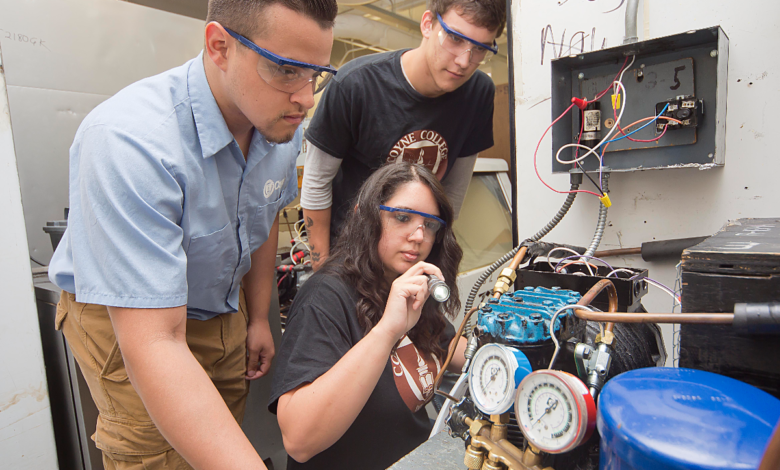Should You Start An HVAC Training Course?

Should You Start An HVAC Training Course? Enrolling in an HVAC training program can lead to a profitable career with growth possibilities and employment stability. Professionals with the necessary training are crucial due to the growing need for HVAC systems in both residential and commercial buildings.
Participating in an HVAC training course can acquire important skills and information for installing, maintaining, and repairing HVAC systems. Students will gain the knowledge and skills necessary to succeed in the profession and land jobs thanks to this practical training.
Furthermore, finishing an HVAC training program can result in certificates that show companies that you are proficient, which improves your chances of finding employment and raises your earning potential. Enrolling in an HVAC training program can be a prudent investment in one’s future, opening doors to a stable and fulfilling profession in a developing field.
Benefits of HVAC Training Courses
These programs give students the technical know-how and real-world experience they need to succeed in the field. People can build a solid basis for installing, maintaining, and repairing HVAC systems by completing HVAC training. Higher earnings and improved career chances in the field may result from this specialized training.
Furthermore, with the growing demand for climate control, HVAC specialists are in high demand. Additionally, training programs keep people up to date on technological developments and industry trends, enabling them to operate the newest HVAC equipment. In general, anyone looking for a fulfilling job in a steady and expanding business may find a wealth of chances by investing in HVAC training programs.
HVAC Training Prepares You To Be An HVAC Technician
Students who complete this extensive program will have the knowledge and practical experience necessary to effectively troubleshoot, repair, and maintain heating, ventilation, and air conditioning systems. Students gain knowledge of electrical circuits, refrigeration systems, HVAC equipment, tools, safety procedures, and green technology.
Furthermore, they learn how to read schematics, calculate loads, and comprehend HVAC rules and specifications. Using hands-on training activities and simulated scenarios, students acquire the capacity to precisely identify problems, offer efficient solutions, and guarantee peak performance of HVAC systems.
A fulfilling career in a stable and expanding field can be yours with HVAC training, as there is a growing demand for HVAC technicians in residential, commercial, and industrial settings. Graduates are well-equipped to start a rewarding career as HVAC technicians, contributing to society by using their knowledge of HVAC systems to make people feel comfortable and safe.
HVAC Training Without Digging Through Your Savings?
A lot of trade schools and community colleges provide reasonably priced HVAC programs that are designed to satisfy industry standards. Additionally, some firms support apprenticeship programs that allow you to gain work experience while receiving compensation.
In addition, you can acquire useful skills for a small portion of the price of conventional training programs by taking advantage of online courses and self-study alternatives. You can begin a career in HVAC without incurring a large financial load by looking into these options. You can get the education and expertise you need to thrive in this in-demand sector without going broke if you put in the necessary effort and attention.
What Does an HVAC Technician Do?
Installing, maintaining, and repairing heating, ventilation, and air conditioning systems in residential and commercial buildings is the responsibility of an HVAC technician. To identify problems and perform required repairs, they need to have a solid understanding of how these systems operate.
HVAC specialists also maintain systems on a regular basis to make sure they are operating effectively. This could entail testing the system’s general performance, cleaning the filters, and looking for leaks. Technicians may also be needed to install ductwork and do insulation work in addition to working on HVAC systems.
Since HVAC technicians frequently interact directly with clients to discuss problems with their systems and provide solutions, effective communication skills are crucial. All things considered, HVAC specialists are essential to making sure that building occupants are secure and comfy.
Conclusion
Enrolling in an HVAC training program might be a wise investment in your future career, given the wide range of prospects in the HVAC industry and the rising demand for qualified experts. The HVAC training course opens doors to satisfying employment options and possible career progression, whether your goal is to work in an area with plenty of job prospects or to expand your skill set. Acquiring extensive knowledge and hands-on experience in HVAC (heating, ventilation, and air conditioning) systems gives you the edge you need to succeed in this vital field. Thus, if you’re wondering if you should enroll in an HVAC training program, the answer is definitely yes—it might be the first step towards a rewarding and successful career path.



